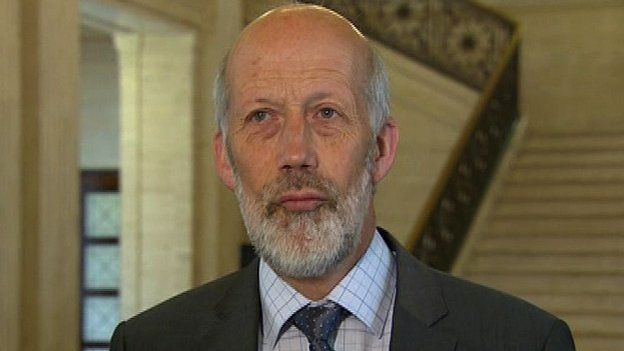NI abortion law: Legalisation in fatal foetal abnormality cases recommended
- Published

A change to Northern Ireland's abortion law, allowing terminations in fatal foetal abnormality cases, has been recommended by the Justice Department.
A fatal foetal abnormality diagnosis means doctors believe a baby will die in the womb or shortly after birth.
Justice Minister David Ford said he will ask the Northern Ireland Executive for approval to introduce legislation, which then requires an Assembly vote.
However, he said he will not try to legalise abortion in cases of rape.
Mr Ford made the announcement following a public consultation on proposed reforms to Northern Ireland's abortion law, which is different from the rest of the UK.
At present, women who have become pregnant as the result of rape, or who are told they are carrying a child that is too ill to survive, are not entitled to a legal abortion in Northern Ireland.
Conscience clause
The issue of fatal foetal abnormality has been examined by health and justice officials over the past 18 months, following a high-profile case featured on the BBC's Nolan Show.
Northern Ireland woman Sarah Ewart contacted the programme to highlight the choice she faced - of either carrying her baby until it died in her womb or travelling to Great Britain where she could access a legal termination.
At the time, Mr Ford said Northern Ireland's abortion law should be re-examined with regard to the issue of fatal foetal abnormality.
A year later, in October 2014, Stormont's Department of Justice began its consultation, where the public were asked to comment on amending the criminal law on abortion.
On Thursday, the justice committee heard there was substantial support for limited changes to the law, which should also include a conscience clause in the legislation to allow doctors and nurses to opt out of the termination procedure, but not in the woman's aftercare.
'Tragic cases'
In a statement, Mr Ford said: "In the limited circumstances of a foetal abnormality which is likely to cause death either before birth, during birth or in an initial period after birth, and where no treatment other than palliative care could be offered to improve the chances of survival, my view is that the health and wellbeing of the woman must take priority and that the law should be clear and offer certainty.
"I therefore intend to proceed to ask the [Northern Ireland] Executive for its approval to bring forward legislation to the Assembly which would allow for termination of pregnancy in these tragic cases.
"I am also proposing to allow for the inclusion of a conscience clause in the legislation, but will not proceed with changes relating to pregnancy resulting from sexual crime," the minister added.
A spokesman for the Department of Health said: "The Minister will consider the consultation response published today and any proposals for draft legislation which emerge, and discussion will take place between Ministers at the Executive table.
"Health officials provided medical and policy advice to the Department of Justice as required during the development of their consultation document.
"Minister Wells has indicated he intends to bring guidelines for health professionals on Termination of Pregnancy to the Executive within weeks."
- Published18 August 2014
- Published5 December 2013
- Published9 October 2013